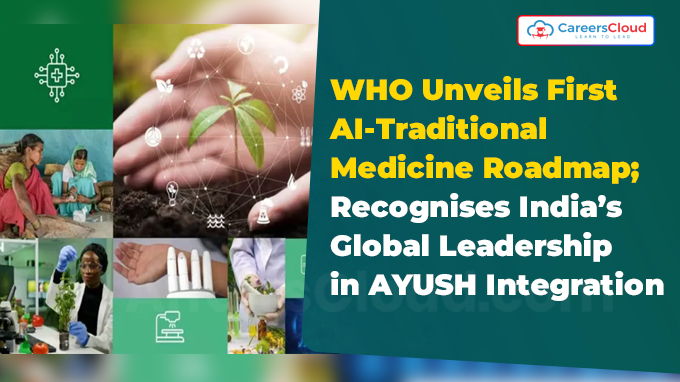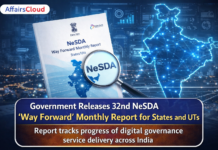
In July 2025, the World Health Organisation (WHO) released a technical brief titled “Mapping the Application of Artificial Intelligence in Traditional Medicine“, recognising India’s leadership in integrating Artificial Intelligence (AI) with traditional medicine, especially within the AYUSH (Ayurveda, Yoga & Naturopathy, Unani, Siddha, and Homeopathy)system.
- Building on India’s proposal, the WHO unveiled its first-ever roadmap for integrating AI into traditional medicine, underscoring India’s leadership in this field.
Key Highlights:
i.The document highlighted that, integrating AI with AYUSH systems and through pioneering digital platforms such as the SAHI (Showcase of Ayurvedic Historical Imprints) portal, NAMASTE (National AYUSH Morbidity and Standardized Terminologies Electronic Portal) portal, and the Ayush Research Portal has two main benefits:
- Safeguarding India’s centuries old medical wisdom.
- Leading the path in shaping an evidence-based and globally accessible healthcare.
ii.The WHO publication acknowledges both India’s growing influence in the global traditional medicine system and India’s innovation in the AI and Ayush space.
iii.India’s initiative to digitise traditional knowledge through the Traditional Knowledge Digital Library (TKDL) is globally recognised as a leading example of preserving and responsibly utilising indigenous medical heritage.
- With this achievement, India became the first country to establish a TKDL, setting a global standard in safeguarding and digitising centuries-old traditional wisdom.
- AI tools are also used to organise and understand old texts, making ancient healing knowledge easier to access.
iv.The WHO also highlighted the use of AI to understand how medicines work, compare different traditional systems like Ayurveda, Traditional Chinese Medicine (TCM), and Unani, and create smart sensors to measure traditional qualities like Rasa (taste), Guna (properties), and Virya (potency).
v.Other key projects include:
- Predictive Diagnostics using Prakriti-based machine learning for better diagnosis and personalized care.
- Ayurgenomics, combining Ayurveda and genomics to identify disease markers through AI analysis.
- Ayush Grid, a digital health platform launched in 2018 supporting several citizen-focused portals.
About Traditional Knowledge Digital Library(TKDL):
It is an Indian initiative aimed at preserving and digitising traditional knowledge while promoting the responsible use of the country’s indigenous medical heritage.It uses AI-powered tools to catalogue and analyze ancient texts, making them more accessible and easier to understand.
- TKDL was established in 2001 through a collaboration between the Council of Scientific and Industrial Research (CSIR) and the Ministry of AYUSH.
About Key Digital Platforms:
i.SAHI Portal: It is a digital platform developed by the CCRAS-National Centre of Indian Medical Heritage in Hyderabad. It aims to present the history of Ayurveda from prehistoric times to the present day by showcasing validated primary evidence. It was launched in 2021.
ii.NAMASTE Portal: It is a digital platform, launched in 2017, developed by the Ministry of AYUSH in India. The main objective of the NAMASTE portal is to promote the usage of electronic health records across the AYUSH domain.
iii.AYUSH Research Portal(ARP): It is an online platform, launched in 2011, developed by the Ministry of AYUSH to disseminate research information related to traditional Indian medicine systems.
About Ministry of AYUSH
Minister of State (MoS)(Independent Charge, IC) – Jadhav Prataprao Ganpatrao (Constituency – Buldhana,Maharashtra)




